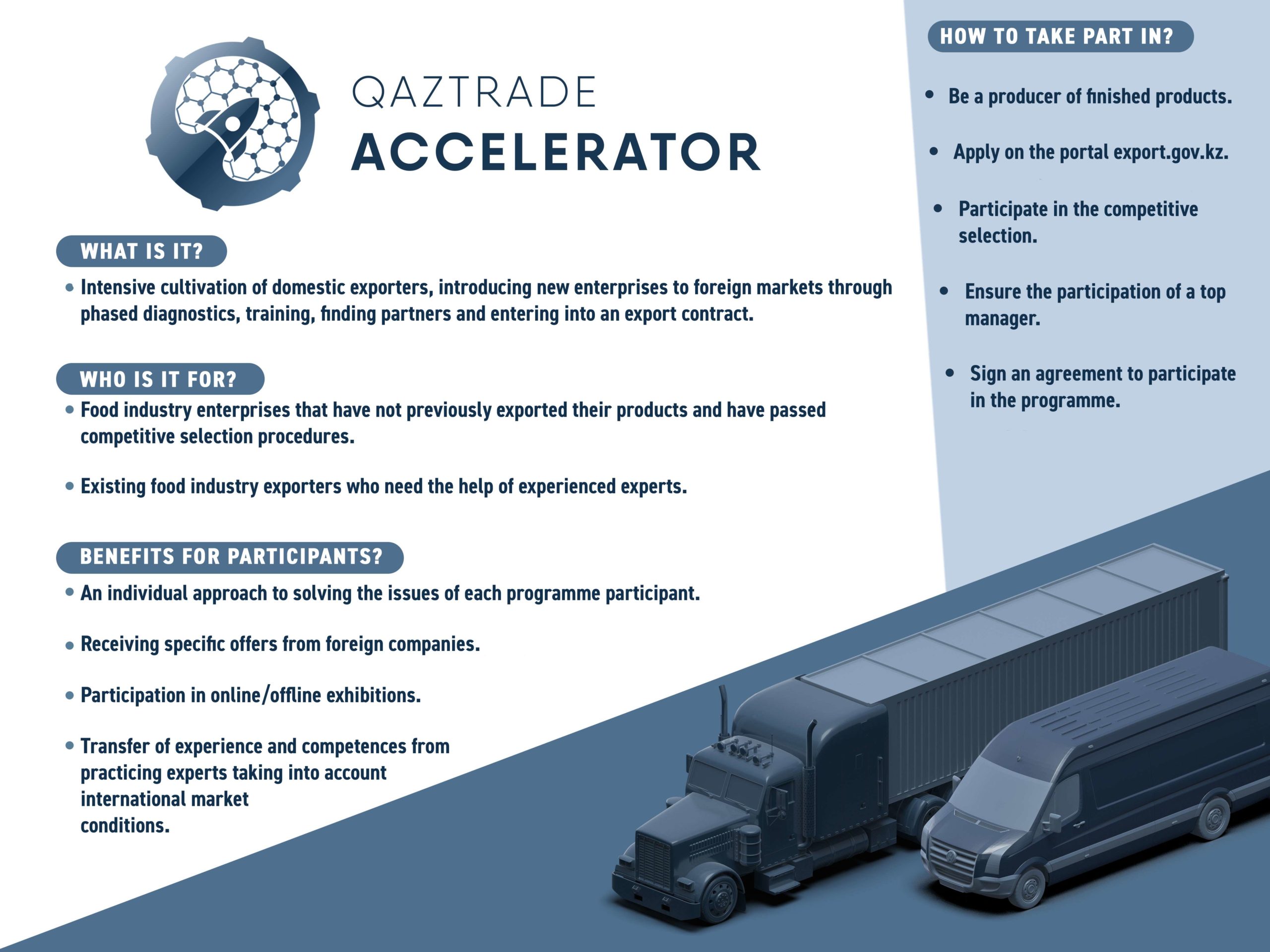The QazTrade trade policy development center recently launched an export accelerator program to help domestic exporters expand their export development opportunities with an intensive coaching seminar from experts and business consultants. The first stage of the program will focus on getting agriculture and food producers out onto the world markets, exporting their goods.

QazTrade is among the latest efforts Kazakhstan has undertaken to help its domestic procedures. In April 2019, the government announced it would allocate $1.28 billion to expand financial and non-financial support for domestic enterprises in the next three years. Photo credit: Kazakh Ministry of Trade and Integration
The center was established in September of 2019 thanks to an initiative by the Ministry of Trade and Integration, which serves as a command point promoting and coordinating support measures for Kazakh exporters.
The selection of favored exporters will be carried out throughout the month of June. To submit an application, companies must fill out an online application at export.gov.kz. The website also includes key information needed by current and potential exporters and importers, offering businesspeople interactive analytics, tools to calculate delivery routes, and a comprehensive review of the Kazakh export market.
“For many businesses, entering the international market seems like a long and complicated process. There is a lot of information out there and it is easy to get confused when you do not understand what exactly you are looking for. Indecisiveness, lack of experience, and often, lack of the ability to assess the market or capabilities of the company are among the reasons many give up their export plans, though many Kazakh goods are capable of competing with foreign counterparts,” said QazTrade Centre Director Arman Abenov.
Companies already exporting their products and those who are only considering exporting are all eligible for the program.
“The most important thing is to have products ready to go that can be offered to a foreign buyer. An enterprise should not just produce a product, but also have it ready for sale, with a package and a name. And there should also be a sufficient amount of this product available so that it is not just a one-time batch, but a long-term supply channel for foreign customers,” said Abenov.
Local akimats (city and regional administrations) suggested 300 companies be included in the preliminary list and almost all companies are small and medium enterprises, but only 30 to 40 companies will make it into the prestigious program.
“A special commission will make the final decision. It will evaluate the company’s export readiness based on whether there are enough volumes for sale, whether the package design meets the standards and rules of a given country or market that the exporter seeks to enter. For example, obtaining a certificate of compliance with Chinese standards can take more than a year, all while Chinese representatives come to Kazakhstan, take samples, and fill out a long list of forms. Even with the best of intentions, the program consultants would not be able to ensure an export contract to this producer,” said Abenov, noting the higher the readiness of the product, the faster the producer will find a foreign partner to sign the deal.
The program participants will receive expert consulting for free, including assistance to potential markets, help to find foreign partners, and help in clearing the necessary bureaucratic hurdles.
Kazakhstan, Central Asia’s largest economy, currently sends 800 products to 120 countries. The country exported $57.7 billion in goods and services in 2019, according to the national statistics committee.
The European Union is Kazakhstan’s largest trading partner, accounting for nearly half of the country’s exports. China, Japan, India, Russia, Switzerland, Turkey, the United Arab Emirates, the United Kingdom, and Uzbekistan are also among the main consumers of Kazakh products.
While the country ships processed goods including copper, ferroalloys, unalloyed steel flat products, oil products, wheat, and sunflower oil. To move away from a commodity-based economy, Kazakhstan seeks to boost non-oil exports one-and-a-half fold by 2022 and two-folds by 2025, bringing the volume up to $41 billion. In 2019, it seeks to generate $18.6 billion in non-oil exports.
The country will focus on its priority export markets, including China, Germany, Iran, the United Arab Emirates, and Turkey.
